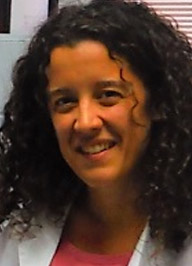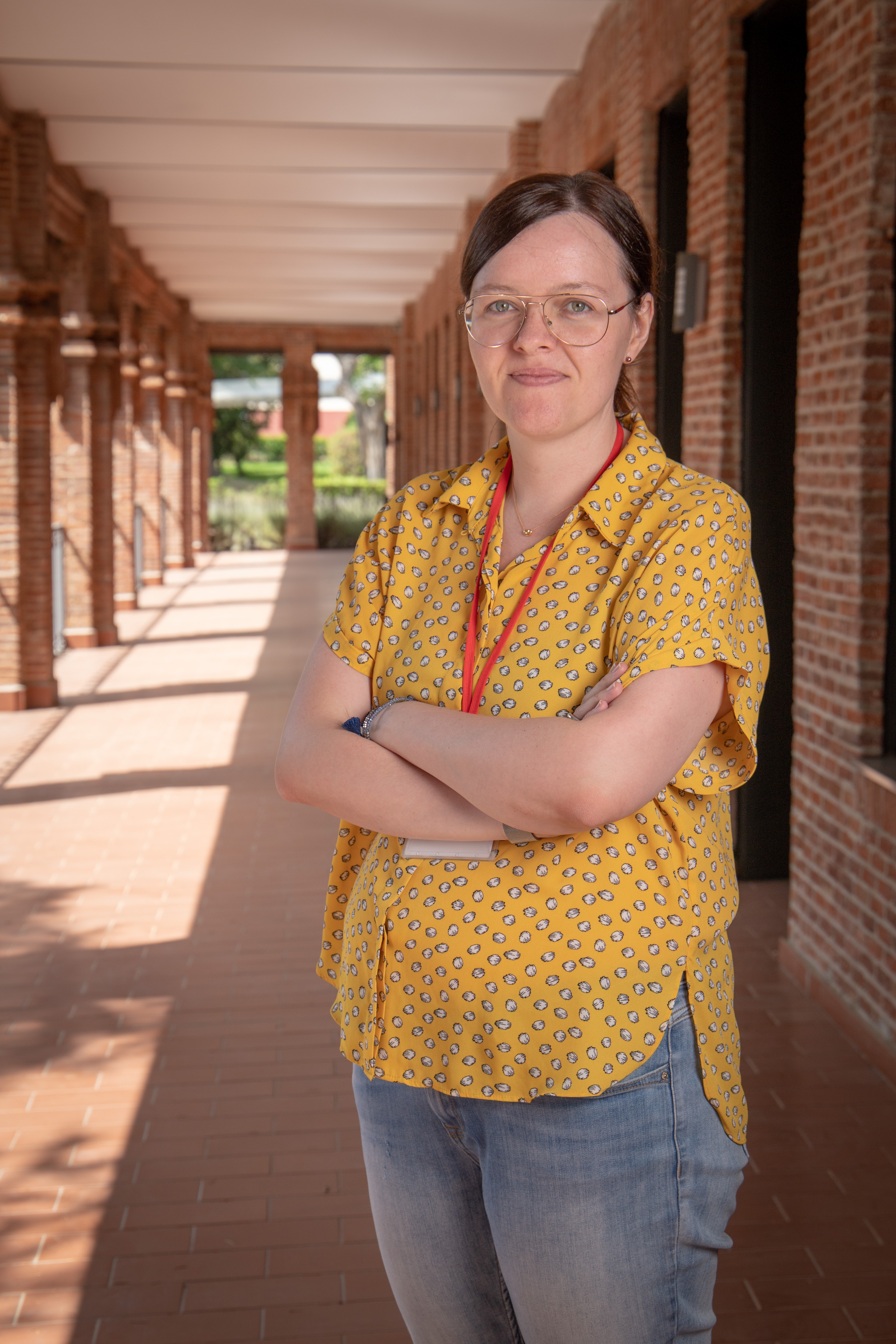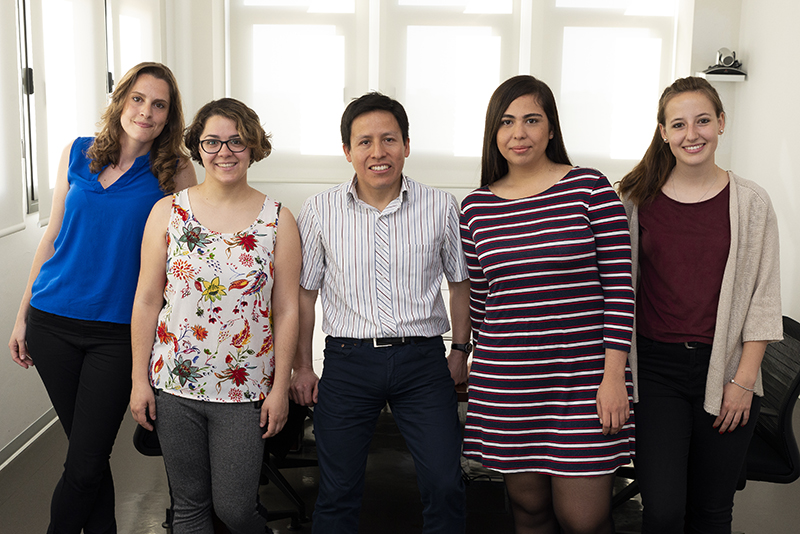Research Program. Precision Nutrition and
Cardiometabolic Health
Epigenetics of Lipid Metabolism Group
Group leader: Dr. Alberto Dávalos Herrera
Objectives: cardiometabolic diseases are the main causes of mortality in the world and excess in the diet is one of the main causes of these human diseases linked to our modern life-style. The objective is to understand how different non-coding RNAs regulate lipid metabolism during states of health and disease, developing new strategies, both pharmacological and dietetic, to modulate their function. Pharmacological or dietary modulation of the activity of non-coding RNAs that, ultimately, regulate the metabolism of lipids lead to the prevention or treatment of cardiometabolic diseases. The increasing prevalence of chronic diseases has prompted a strategic focus on prevention strategies. While Precision (personalized) Medicine strives to provide ‘the right therapeutic strategy for the right person at the right time’ a distinct approach is needed for disease prevention.
Epigenetics of Lipid Metabolism Group also focus on understanding lifestyle modification of the pigenome in order to try to personalize the health of individuals using epigenetics for the development of Precision Nutrition. This group works to generate new basic knowledge of how non-coding RNAs regulate the metabolism of lipids under physiological and pathological conditions. To find and evaluate minor dietary components for their ability to modulate the activity of non-coding RNAs associated with the metabolism of lipids.
To carry out collaborative projects with the food and pharmaceutical industry to test and develop new dietary supplements or functional foods based on solid scientific knowledge to prevent or treat a variety of lipid metabolism disorders. And, to incorporate the use non-coding RNAs data to develop Precision Nutrition. In this endeavor, the group actively collaborate with many international research groups located at the following institutions: CINVESTAV (Mérida, Mexico), URFJ (Rio de Janeiro, Brasil), IMSERM UMR1011 (Lille, France) and many other national research groups.
Dr. Alberto Dávalos Herrera
Group leader of the Epigenetics of Lipid Metabolism Group
 Dr. Alberto Dávalos holds a degree in Pharmacy and Biochemistry by San Marcos University (Lima) and a PhD in Pharmacy by Universidad Complutense de Madrid (Madrid). He has conducted postdoctoral research at the Hospital Ramón y Cajal (Madrid), at Yale University School of Medicine, (New Haven), and at New York University School of Medicine (New York). Dr. Dávalos’s research program focuses in identifying and characterizing new noncoding RNAs (miRNAs, lncRNAs and other type of regulatory RNAs) that regulate lipid metabolism and the effects of minor dietary components (micronutrients) on their expression.
Dr. Alberto Dávalos holds a degree in Pharmacy and Biochemistry by San Marcos University (Lima) and a PhD in Pharmacy by Universidad Complutense de Madrid (Madrid). He has conducted postdoctoral research at the Hospital Ramón y Cajal (Madrid), at Yale University School of Medicine, (New Haven), and at New York University School of Medicine (New York). Dr. Dávalos’s research program focuses in identifying and characterizing new noncoding RNAs (miRNAs, lncRNAs and other type of regulatory RNAs) that regulate lipid metabolism and the effects of minor dietary components (micronutrients) on their expression.
Noncoding RNAs have been recognized as critical modulators of cardiovascular system in health and disease. He hopes to: (i) identify new therapeutic strategies through modulating noncoding RNAs levels by the diet or other lifestyle factors to treat dyslipidemia and to prevent atherosclerosis and cardiovascular diseases; and (ii) understand lifestyle modification of the epigenome and personalize the health of individuals using epigenetics (particularly noncoding RNAs) for the development of Precision Nutrition.
Email: alberto.davalos@imdea.org
Phone: +34 91 727 81 00, ext. 206
Members
Dr. Almudena García-Ruiz
Senior researcher and Head of Research Line in “smORFs-metabolismo lipídico” and “miRNA humanos-microbiota”

Dr. Almudena García-Ruiz holds a Biology degree and a Food Science and Technology degree by University of Seville and University of Cordoba, respectively. She received her PhD in Food Science and Technology and Chemical Engineering from Autonomous University of Madrid.
Her pre-doctoral research was focused on the study of the effect of polyphenols on the growth and metabolism of oenological lactic acid bacteria (LAB) and its potential application as antimicrobial additives in oenology. In addition, during this period she has also worked in the production of biogenic amines by LAB and in the degradation of biogenic amines by vineyard ecosystem fungi and LAB.
During her post-doctoral period, first, she evaluated of probiotic and immunomodulatory activity of enological lactic acid bacteria and new silver nanoparticle with antimicrobial capacity, application in the wine industry. Then, her research was focused on obtaining functional ingredients from quinoa, and fruits native Ecuador as well as on the analysis of phenolic fraction and antioxidant activity of new varieties of Ecuadorian cocoa.
Currently, she is working in IMDEA Food Institute (Epigenetics of Lipid Metabolism Group) evaluating the potential of "small open reading frames (smORF)" as new modulators of disorders of dietary excess, focusing mainly on those that influence lipid metabolism. She works under the funding of a MSCA Fellowship and Plan Nacional (RTI2018-093873-A-I00).
Mail: almudena.garcia@imdea.org
Tlf. + 34 91 727 81 00 Ext: 308
 Dr. M. Carmen López de las Hazas
Dr. M. Carmen López de las Hazas
Postdoctoral researcher
Dr. M. Carmen López de las Hazas studied Human Nutrition and Dietetics, and Food Science and Technology in Autonomous University of Madrid. She obtained her Master Degree in Agricultural Chemistry and Novel Foods in Autonomous University of Madrid. Her PhD (international mention) has been obtained in the University of Lleida.
Her research career starts in CIAL institute (2010-2013), focus on the extraction, characterization and evaluation of the biological properties of bioactive compounds of different food matrices. In 2013, she joined the group of Dr. María José Motilva at the University of Lleida where she gained expertise in the in vivo metabolism of olive oil phenolic compounds and their tissue disposition. Also, she studied the cardioprotective bioactivity of hydroxytyrosol and their metabolites using in vitro and in vivo models. Furthermore, she studied the colonic metabolism of different phenolic compounds structures and evaluate their anticarcinogenic activity in colonic cells.
Nowadays, she is working in IMDEA Food Institute (Epigenetics of Lipid Metabolism Group) evaluating the microRNAs and long non-coding RNAs involved in postprandial lipemia and their relationship in the lipid metabolism.
Her scientific activity is being reflected in a total of 14 research publications, being 6 of them as first author. Furthermore, her research work has been published in 3 international congress and has been worked in 3 research projects.
Email: mcarmen.lopez@imdea.org
Phone: +34 91 727 81 00 Ext: 306
Judit Gil Zamorano
Technician Doctor of the laboratory Judit Gil Zamorano has a degree in Biotechnology from the Universidad Complutense de Madrid (2011). In 2012, as part of IMDEA's Starts program, she participated in the study of the mechanisms by which the consumption of DHA reduces the risk of cardiovascular diseases, trying to show whether the beneficial effect of DHA could be partly modulated by microRNAs. She is a Senior Technician in Clinical Diagnostic Laboratory and in 2014 she made a stay in the Laboratory of Spirochetes and Special Pathogens (National Microbiology Center, ISCIII) where she learned the techniques for the microbiological diagnosis of infections by bacterial pathogens transmitted by arthropods. Since November 2014 he has been developing his doctoral thesis as a member of Dr Alberto Dávalos' Epigenetics of Lipid Metabolism group at IMDEA Food. Her research objectives include the study of the role of non-coding RNAs (ncRNAs) in different biological processes associated with lipid metabolism and cardiometabolic diseases; the search for mechanisms of gene regulation in the enterocyte through ncRNAs, especially microRNAs as well as their role in intercellular communication between the intestine and other tissues, in physiological and pathological conditions in order to address new therapeutic perspectives. She has recently obtained the PhD title from the Complutense University of Madrid (September 2020).
Judit Gil Zamorano has a degree in Biotechnology from the Universidad Complutense de Madrid (2011). In 2012, as part of IMDEA's Starts program, she participated in the study of the mechanisms by which the consumption of DHA reduces the risk of cardiovascular diseases, trying to show whether the beneficial effect of DHA could be partly modulated by microRNAs. She is a Senior Technician in Clinical Diagnostic Laboratory and in 2014 she made a stay in the Laboratory of Spirochetes and Special Pathogens (National Microbiology Center, ISCIII) where she learned the techniques for the microbiological diagnosis of infections by bacterial pathogens transmitted by arthropods. Since November 2014 he has been developing his doctoral thesis as a member of Dr Alberto Dávalos' Epigenetics of Lipid Metabolism group at IMDEA Food. Her research objectives include the study of the role of non-coding RNAs (ncRNAs) in different biological processes associated with lipid metabolism and cardiometabolic diseases; the search for mechanisms of gene regulation in the enterocyte through ncRNAs, especially microRNAs as well as their role in intercellular communication between the intestine and other tissues, in physiological and pathological conditions in order to address new therapeutic perspectives. She has recently obtained the PhD title from the Complutense University of Madrid (September 2020).
Email: judit.gil@imdea.org
Phone: +34 91 727 81 00 , ext. 303
Diana Carolina Mantilla Escalante
Phd. Student Diana Carolina Mantilla Escalante is a PhD student in Food Sciences at the Universidad Autónoma de Madrid (Spain) in Food Sciences. In 2013 she obtained her degree in Food Engineering from the Universidad de Cartagena (Colombia). Since 2016 she has been part of the international postgraduate studies program of the CEIBA Foundation (Bogotá, Colombia), through which she obtained her Master Degree in Novel Foods from the Universidad Autónoma de Madrid and is now part of the laboratory of epigenetics of lipid metabolism led by Dr. Alberto Dávalos. She is currently carrying out her research work at the Madrid Institute for Advanced Studies IMDEA Food, which seeks to identify and characterize non-coding RNAs modulated by the components of the diet to fi nd new therapeutic strategies to help prevent or treat disorders associated with lipid metabolism and thus promote the development of precision nutrition and specifi c food uses for health.
Diana Carolina Mantilla Escalante is a PhD student in Food Sciences at the Universidad Autónoma de Madrid (Spain) in Food Sciences. In 2013 she obtained her degree in Food Engineering from the Universidad de Cartagena (Colombia). Since 2016 she has been part of the international postgraduate studies program of the CEIBA Foundation (Bogotá, Colombia), through which she obtained her Master Degree in Novel Foods from the Universidad Autónoma de Madrid and is now part of the laboratory of epigenetics of lipid metabolism led by Dr. Alberto Dávalos. She is currently carrying out her research work at the Madrid Institute for Advanced Studies IMDEA Food, which seeks to identify and characterize non-coding RNAs modulated by the components of the diet to fi nd new therapeutic strategies to help prevent or treat disorders associated with lipid metabolism and thus promote the development of precision nutrition and specifi c food uses for health.
Email: diana.mantilla@imdea.org
Phone: +34 91 727 81 00 , ext. 308
Lorena del Pozo Acebo
Phd. Student Lorena del Pozo Acebo has an undergraduate degree in Biotechnology from CEU-San Pablo University (Madrid), where she carried out her Final Degree Project by studying the effect of a fatty acid diet in the fetus lipid profi le. During her studies, she also worked in BioAssays S.L. (located in “Parque Científi co”, Madrid) applying Molecular Biology techniques. She continued her studies obtaining a Master degree in Biomolecules and Cell Dynamics at the “Universidad Autónoma de Madrid”, completing her Final Master Project in Virology and Microbiology areas at the “Centro de Biología Molecular Severo Ochoa”, where she studied different mutations introduced in HIV retrotranscriptase and their effect on DNA-polymerase activity. Later she completed a Lab Placement at the University of Birmingham (UK) where she worked in areas such as Biorremediation and Enviromental Genomics. She has recently joined the IMDEA-Food Institute as pre-doctoral researcher to work in Epigenetics of Lipid Metabolism Group evaluating the infl uence that the diet has on the modulation of non-coding RNAs and their effect on the gut microbiota for the development of new therapeutic strategies, both pharmacological and dietetic.
Lorena del Pozo Acebo has an undergraduate degree in Biotechnology from CEU-San Pablo University (Madrid), where she carried out her Final Degree Project by studying the effect of a fatty acid diet in the fetus lipid profi le. During her studies, she also worked in BioAssays S.L. (located in “Parque Científi co”, Madrid) applying Molecular Biology techniques. She continued her studies obtaining a Master degree in Biomolecules and Cell Dynamics at the “Universidad Autónoma de Madrid”, completing her Final Master Project in Virology and Microbiology areas at the “Centro de Biología Molecular Severo Ochoa”, where she studied different mutations introduced in HIV retrotranscriptase and their effect on DNA-polymerase activity. Later she completed a Lab Placement at the University of Birmingham (UK) where she worked in areas such as Biorremediation and Enviromental Genomics. She has recently joined the IMDEA-Food Institute as pre-doctoral researcher to work in Epigenetics of Lipid Metabolism Group evaluating the infl uence that the diet has on the modulation of non-coding RNAs and their effect on the gut microbiota for the development of new therapeutic strategies, both pharmacological and dietetic.
Email: lorena.delpozo@imdea.org
Phone: +34 91 727 81 00 , ext. 308
Aida Serra
Senior researcher and Head of Research Line in +Pec Proteomics
Dr. Aida Serra joined IMDEA Food Institute as senior researcher in June 2019 through the Talents Attraction plan of the Autonomous Community of Madrid. Dr. Serra has been researcher and fellow scholar at the Nanyang Technological University of Singapore from 2013 to 2019. Her research is based on the application of mass spectrometry technologies to clinical proteomics and at IMDEA Food her research lines focus on the investigation of extracellular vesicles from foods and lipids of the diet to fight dementia and neurodegen- erative conditions.
Email: aida.serra@imdea.org
Phone:
Belén Ruiz Rosso
Postdoctoral Researcher  Dr. Mª Belén Ruiz-Roso holds a Pharmacy degree by Complutense University of Madrid (UCM) and obtained her PhD from the Faculty of Medicine, UCM, with the highest qualification. Her pre-doctoral research was focused on the study of neuroprotective effects of omega-3 fatty acids in cognitive function and neurodegenerative processes in Department of Physiology and Department of Psychobiology (UCM). In addition, during this period she has also studied different types of functional foods and their bioactive compounds and cardioprotective effects. During her post-doctoral period, she has conducted a clinical trial in patients to determine the effects of probiotics on Obesity, Insulin Resistance Syndrome, Type 2 Diabetes and Non-Alcoholic Fatty Liver Disease, at the Department of Endocrinology, La Princesa Hospital of Madrid. She joined IMDEA Food in 2019 to carry out her postdoctoral research under the supervision of Dr. Alberto Dávalos (Epigenetics of Lipid Metabolism Group). Her research at IMDEA Food Institute focuses on microRNAs and long non-coding RNAs involved in lipid metabolism. Her scientific activity has been reflected in original research supported by 14 research publications, being 6 of them as first author, 4 research projects and several conferences to national and international congresses.
Dr. Mª Belén Ruiz-Roso holds a Pharmacy degree by Complutense University of Madrid (UCM) and obtained her PhD from the Faculty of Medicine, UCM, with the highest qualification. Her pre-doctoral research was focused on the study of neuroprotective effects of omega-3 fatty acids in cognitive function and neurodegenerative processes in Department of Physiology and Department of Psychobiology (UCM). In addition, during this period she has also studied different types of functional foods and their bioactive compounds and cardioprotective effects. During her post-doctoral period, she has conducted a clinical trial in patients to determine the effects of probiotics on Obesity, Insulin Resistance Syndrome, Type 2 Diabetes and Non-Alcoholic Fatty Liver Disease, at the Department of Endocrinology, La Princesa Hospital of Madrid. She joined IMDEA Food in 2019 to carry out her postdoctoral research under the supervision of Dr. Alberto Dávalos (Epigenetics of Lipid Metabolism Group). Her research at IMDEA Food Institute focuses on microRNAs and long non-coding RNAs involved in lipid metabolism. Her scientific activity has been reflected in original research supported by 14 research publications, being 6 of them as first author, 4 research projects and several conferences to national and international congresses.
Email: belen.ruizroso@imdea.org
Luis Chapado
Predoctoral Researcher
Pre-doctoral Luis Antonio Chapado Chorro, holds a Telecommunications degree by UPM, Research and Market Techniques by UOC and a master degree on Bioinformatics and Computational Biology by UAM.  During his career in telecommunications he was Senior Solution Architect, he provides complex network computer solution, where he delivery his expertise in many countries in Europe, Africa, Middle East and Latin America. He uses his background in network computing, his experience in programming in Python and R and his knowledge of Data mining and Machine Learning to build bioinformatic applications and automatic execution pipelines. He is an active collaborator with the “Instituto de Salud Carlos III” (ISCIII) where he develops bioinformatic tools like iSkyLIMS, and open source software designed to track sample data from laboratory to support the modern laboratory operations, Taranis a software designed for microbial outbreak research using a gene-by-gene approach, using a cgMLST schema downloaded from known database as pubMLST or Enterobase, Taranis evaluates the schema and performs allele calling for clusters identification. Or OpenRobots a web tool to manage the scripts that Opentrons Robots requires for automation of RT-PCR diagnostics of covid19. He builds RasNion20, a cluster Raspberry to create a testing environment to optimize the pipelines before executing in the High-performance computing (HPC).
During his career in telecommunications he was Senior Solution Architect, he provides complex network computer solution, where he delivery his expertise in many countries in Europe, Africa, Middle East and Latin America. He uses his background in network computing, his experience in programming in Python and R and his knowledge of Data mining and Machine Learning to build bioinformatic applications and automatic execution pipelines. He is an active collaborator with the “Instituto de Salud Carlos III” (ISCIII) where he develops bioinformatic tools like iSkyLIMS, and open source software designed to track sample data from laboratory to support the modern laboratory operations, Taranis a software designed for microbial outbreak research using a gene-by-gene approach, using a cgMLST schema downloaded from known database as pubMLST or Enterobase, Taranis evaluates the schema and performs allele calling for clusters identification. Or OpenRobots a web tool to manage the scripts that Opentrons Robots requires for automation of RT-PCR diagnostics of covid19. He builds RasNion20, a cluster Raspberry to create a testing environment to optimize the pipelines before executing in the High-performance computing (HPC).
Email: luis.chapado@imdea.org
Visiting Researches
University of Rio de Janeiro
Patricia Padilha, Universidade Federal do Rio de Janeiro. March-June 2020.
Wilza A. F. Peres, Universidade Federal do Rio de Janeiro. October 2020-January 2021.
Students
Diana Carolina Mantilla Escalante
Andrea del Saz Lara
Inés Ruiz Pérez
Laura Comas Ibáñez
Paula Gil Cabrerizo
Silvia Hernández de la Red
| most relevant publications |
|
| main research grants |
|
Principal Investigator: Alberto Dávalos ___________ Principal Investigator: Alberto Dávalos ___________ Principal Investigator: Alberto Dávalos ___________ Principal Investigator: Alberto Dávalos ___________ Principal Investigator: Anna P. Pierucci (INJC, UFRJ) ___________ Principal Investigator: Alberto Dávalos ___________ |

